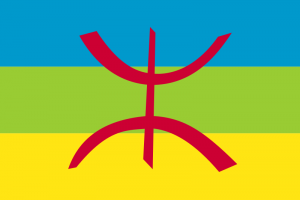Language/Standard-moroccan-tamazight/Vocabulary/Travel-Dialogue-Practice
| ◀️ Places in Town — Previous Lesson | Next Lesson — Eid al-Adha ▶️ |
Introduction[edit | edit source]
In this lesson, we will practice common travel dialogues to improve your Tamazight speaking skills. Traveling is a universal experience, and being able to communicate effectively in Tamazight during your travels can enhance your cultural understanding and make your journey more enjoyable. This lesson is designed for beginners who have already learned the basics of the Tamazight language and are ready to apply their knowledge in practical situations related to travel and directions.
Throughout this lesson, we will provide you with a range of travel-related vocabulary, phrases, and dialogues. We will cover topics such as asking for directions, transportation, places in town, and more. By the end of this lesson, you will have gained confidence in using Tamazight to navigate new environments and engage in travel conversations.
Travel Dialogue Practice[edit | edit source]
Let's start by practicing some common travel dialogues in Tamazight. These dialogues will simulate real-life situations that you may encounter while traveling. Pay attention to the vocabulary and phrases used in each dialogue, as they will be useful for your future travels in Tamazight-speaking areas.
Dialogue 1: Asking for Directions[edit | edit source]
Traveler: "Salam, afak, 3emrek ach dayer lla?" (Local: "Hello, please, can you tell me how to get to...?")
Local: "Salam, tab3ad, f dakhla l-mellah, ghir darb l-gauche." (Local: "Hello, sure, at the entrance of the medina, just take a left.")
Traveler: "Shukran bzzaf, wach kayn taxi hna?" (Local: "Thank you very much, is there a taxi here?")
Local: "Eey, kayn taxi f l-mellah." (Local: "Yes, there is a taxi in the medina.")
Traveler: "Shukran, wach kayn bus hna li...?" (Local: "Thank you, is there a bus here that goes to...?")
Local: "La, ma kayn walou bus, ghir taxi." (Local: "No, there is no bus, only taxis.")
Traveler: "Mrci, wach kayn llaqra li f had l-maderisa?" (Local: "Thank you, is there a bookstore near these schools?")
Local: "Eey, kayn llaqra f l-mellah." (Local: "Yes, there is a bookstore in the medina.")
Traveler: "Shukran, m3a sslema!" (Local: "Thank you, goodbye!")
Local: "Afwan, m3a sslema!" (Local: "You're welcome, goodbye!")
Dialogue 2: Transportation[edit | edit source]
Traveler: "Salam, wach kayn gare l-bus hna?" (Local: "Hello, is there a bus station here?")
Local: "Eey, kayn gare l-bus f l-wasat." (Local: "Yes, there is a bus station in the center.")
Traveler: "Shukran, wach kayn laqra li katsifti taxi?" (Local: "Thank you, is there a gas station near the taxi stand?")
Local: "Eey, kayn laqra jayba." (Local: "Yes, there is a gas station nearby.")
Traveler: "Shukran, kifach ndwi taxi?" (Local: "Thank you, how do I hail a taxi?")
Local: "Basta d l-bayda, w t'arraf." (Local: "Raise your hand, and they will recognize you.")
Traveler: "Shukran, wach kayn tramway hna?" (Local: "Thank you, is there a tram here?")
Local: "La, ma kayn walou tramway." (Local: "No, there is no tram here.")
Traveler: "Shukran bzzaf, wach kayn l-gara l-kubra hna?" (Local: "Thank you very much, is the main train station here?")
Local: "La, l-gara l-kubra f l-mellah." (Local: "No, the main train station is in the medina.")
Traveler: "Mrci, wach kayn bus li...?" (Local: "Thank you, is there a bus that goes to...?")
Local: "Eey, kayn bus li f l-bab." (Local: "Yes, there is a bus at the gate.")
Traveler: "Shukran, m3a sslema!" (Local: "Thank you, goodbye!")
Local: "Afwan, m3a sslema!" (Local: "You're welcome, goodbye!")
Dialogue 3: Places in Town[edit | edit source]
Traveler: "Salam, wach kayn l-hotel l-akbar hna?" (Local: "Hello, is the biggest hotel here?")
Local: "Eey, l-hotel l-akbar f l-mellah." (Local: "Yes, the biggest hotel is in the medina.")
Traveler: "Shukran, wach kayn laqra f l-kasbah?" (Local: "Thank you, is there a castle in the kasbah?")
Local: "Eey, kayn laqra f l-kasbah." (Local: "Yes, there is a castle in the kasbah.")
Traveler: "Shukran bzzaf, wach kayn l-mosquée hna?" (Local: "Thank you very much, is there a mosque here?")
Local: "Eey, kayn l-mosquée f l-wasat." (Local: "Yes, there is a mosque in the center.")
Traveler: "Shukran, wach kayn l-jama3 lfna hna?" (Local: "Thank you, is there a main square here?")
Local: "Eey, kayn l-jama3 lfna f l-mellah." (Local: "Yes, there is a main square in the medina.")
Traveler: "Shukran bzzaf, wach kayn l-bank hna?" (Local: "Thank you very much, is there a bank here?")
Local: "Eey, kayn l-bank f l-wasat." (Local: "Yes, there is a bank in the center.")
Traveler: "Shukran, wach kayn l-borj hna?" (Local: "Thank you, is there a tower here?")
Local: "La, ma kayn walou borj." (Local: "No, there is no tower.")
Traveler: "Shukran, m3a sslema!" (Local: "Thank you, goodbye!")
Local: "Afwan, m3a sslema!" (Local: "You're welcome, goodbye!")
Conclusion[edit | edit source]
In this lesson, we have practiced common travel dialogues to improve your Tamazight speaking skills. By mastering these dialogues, you will be able to confidently ask for directions, discuss transportation options, and inquire about places in town. Remember to practice these dialogues with a native Tamazight speaker or language partner for additional support and feedback. Keep up the good work, and soon you will be ready to embark on your own Tamazight-speaking adventures!
Other Lessons[edit | edit source]
- Describing Weather Conditions
- Food Vocabulary
- Clothes
- Animals
- Feelings and Emotions
- Languages
- Months of the Year
- Family Members
- Places in Town
- Family
| ◀️ Places in Town — Previous Lesson | Next Lesson — Eid al-Adha ▶️ |

